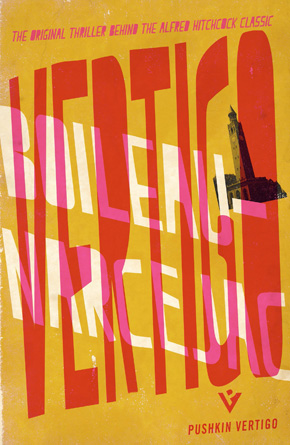The cemetery
by Boileau-NarcejacHe had a bad night. On waking, he remembered he was due to follow Madeleine and was mortified by the joy he felt at the prospect. Try as he would, however, he couldn’t rid himself of it. It clung to him, humble but obstinate, like a dog you haven’t the heart to chase away. He switched on the wireless. More patrol activity! More artillery duels! Good. That wouldn’t stop anybody feeling happy. He settled down to his morning’s work, whistling.
He lunched at a little restaurant whose customers were all habitués. He no longer felt ill at ease to be in civilian clothes – not even when people gave him a dirty look. After all it wasn’t his fault that he hadn’t got through his medical. He didn’t wait till two o’clock to station himself outside the block of flats in the Avenue Kléber. Though the weather had turned fine after a sulky week, there were few people about. Flavières at once spotted the big black car, a Talbot, drawn up in front of the building. He sauntered past it casually.
He took a newspaper out of his pocket and glanced at it idly as he wandered on. Sometimes he actually read a paragraph – a reconnaissance plane shot down in Alsace, reinforcements for Narvik. What did he care? He was on holiday. He had a tryst with Madeleine! He noticed a little café: three tables on the pavement, a couple of spindle-trees. He sat down.
“A coffee, please.”
He was well placed for studying the building. High windows with complicated mouldings in the style of 1900, a balcony with flowers in pots. Dormer windows in the roof, above which the sky was a watery blue. When his eyes came down to earth again, the Talbot was starting up – Gévigne. Madeleine wouldn’t be long now.
He gulped down the scalding coffee, smiling at himself. How did he know she would be coming out this afternoon? Was there any reason why she should?… Yes, there was. She’d come all right. Because of the sunshine, because of the tender green leaves, because of those fluffy seeds floating past on the balmy spring air. Lastly, she’d come because he was waiting for her!
And all of a sudden there she was, standing on the pavement. Flavières promptly dropped his paper, got up and crossed the road. She was wearing a grey suit, very tight at the waist, and her black handbag was tucked under her arm. She looked round her as she finished putting on her gloves. Some delicate white lace fluttered at her throat. Her forehead and eyes were half concealed by a short veil which masked her gracefully. Another portrait! La Femme au Loup.
He would have liked to paint that slim silhouette standing in an aura of sunshine, with the pale background of over-ornate architecture. For he too had dabbled in painting in his day. Without much success. The same with the piano. He played just well enough to envy the masters. He was one of those people who hate mediocrity without themselves being able to scale the heights. Plenty of minor talents… plenty of regrets… But never mind about that! Madeleine was there!
She crossed the Place du Trocadéro, loitered a moment among the people at the end of the Avenue Henri-Martin, then, making up her mind, went into the Cimetière de Passy.”
She followed the avenue right to the Place du Trocadéro, where she went out on to the terrace of the Palais de Chaillot, whose whiteness was almost blinding. Paris had never looked so like a park. Blue and browny-red, the Eiffel Tower rose up from the lawns, the familiar totem of Parisians. On the near side, the gardens sloped down towards the Seine, surrounding the flights of steps which thus looked like motionless cascades bordered by flowers. A tug blew a raucous blast on its siren, quickly muffled as it swept under a bridge. One seemed here to be suspended between peace and war, gripped by a facile emotion that was nevertheless poignant. Was that why Madeleine was now walking with a certain lassitude? She appeared to hesitate, to be taking herself to task. She stopped in front of the entrance to the museum, then drifted on as though caught by some invisible current. She crossed the Place du Trocadéro, loitered a moment among the people at the end of the Avenue Henri-Martin, then, making up her mind, went into the Cimetière de Passy.
She walked slowly between the gravestones, and Flavières could have sworn she was just continuing her walk. She had branched off almost at once from the central alley with its solemn row of crosses in marble and bronze. She went along the little paths, looking casually about her – at the black lettering on the stones, the rusty railings round a vault, the sudden splash of colour where some flowers had recently been left.
Sparrows hopped about in front of her. The roar and clatter of the town seemed to come, filtered, from far away. One might have been transported to some other country on the margin of this life of ours. There was no one to be seen, though many to be felt, each inscription conjuring up an unseen presence.
Amongst them and their stony monuments, Madeleine walked on, her shadow striking between the gravestones or zigzagging up the steps of one of those little chapels over a vault, in which crumbling cherubs kept their vigil. Sometimes she stopped for a moment to read some half-effaced inscription.
FAMILLE MERCIER
ALPHONSE MERCADIER
Il fut bon père et bon époux
There were some gravestones tumbling over sideways like shipwrecked boats. On others lizards basked in the warmth, their throats palpitating, their serpents’ heads lifted towards the sun. Madeleine seemed to feel quite at home in this neglected corner, where no relations ever came. She went on along the path which presently took her right into the heart of the cemetery. She stooped to pick up a red tulip, fallen from a vase, and still with the same leisurely gait went up to one of the graves and stopped. Hidden behind a mausoleum, Flavières was able to watch her at his ease. Madeleine’s face showed neither exaltation nor sorrow. On the contrary, the expression on it was one of peace and happiness. What thoughts were running through her mind? Her arms hung limply at her sides; her fingers still held the tulip. Once again she looked like a portrait, her whole being turned inwards, lost in some interior contemplation.
The word ‘ecstasy’ occurred to Flavières. Was this one of those ‘attacks’ Gévigne had spoken of? Had Madeleine gone off into some sort of mystic trance? No. A mystic trance had certain characteristic symptoms not present here. It was something much simpler: Madeleine must be praying for someone, some member of her family no doubt whose memory was still fresh in her mind, though the tomb looked old enough and quite neglected. That was odd.
Flavières looked at his watch. She had been standing there nearly a quarter of an hour – twelve minutes, to be exact. Now she went back into the central alley, looking around her with the same appearance of being mildly interested, as though in the matter of funereal architecture she had nothing to learn. As he passed, Flavières read the inscription she had been contemplating. It was very short, just:
PAULINE LAGERLA
1840–1865
That, of course, was the name he had expected, but that didn’t make any difference: he was profoundly moved. Gévigne was right: there was something incomprehensible in Madeleine’s conduct – in the way she had stood at the grave, for instance, with neither bowed head nor folded hands, much as a person might stand gazing at the house in which he was born.
He brushed aside that absurd idea, which filled him with a vague uneasiness, and hurried on to overtake her. She was still holding the tulip. She walked down towards the Seine. Again she seemed to droop. Perhaps she was just tired. On the quays, she walked as though aimlessly, as though lost in thought, looking at the rippling water sparkling with points of light. It was hot. Men walked by with their hats in their hands, wiping their foreheads. The water was very blue against the grey stone quays, on which a few tramps lay sleeping. The first swallows twittered round the bridges. With her severely cut grey suit and high heels, she looked something of a stranger at the fête, like a traveller waiting for a train. And from time to time she rolled the stalk of the tulip between her fingers.
Crossing the Seine, she stopped on the bridge and leant with her elbows on the parapet, stroking her cheek with the tulip. Had she given someone a rendezvous?… Or was she simply resting?… Perhaps she was only nursing her own ennui, as she watched the swirling wake of a steamer or the fascinating undulations of the reflections in the water… She leant over the parapet, looking at herself far below in the water, with the whole sky above her and the long curve of the bridge cutting across her shoulders.
It was half past four when she disappeared through the doorway, leaving Flavières high and dry. He felt useless, disgusted. The hours he had spent watching Madeleine made solitude seem unbearable.”
Flavières came quite close to her, not knowing what impelled him to do so. Madeleine didn’t move. She had dropped the tulip, and a little spot of red drifted downstream, turning slowly round and round in the eddies near the bank. It floated past a barge, then farther out into the stream. Flavières found himself, too, getting interested in its fate. The farther it went and the smaller it became, the more impossible was it for him to take his eyes away. Suddenly it was there no longer. Perhaps it had sunk. Madeleine remained, however, staring down at the river. Flavières thought he could see a faint smile on her lips.
She stood up and walked on, returning to the right bank by another bridge. And still with the same unhurried pace and the same indifference to her surroundings, she walked home. It was half past four when she disappeared through the doorway, leaving Flavières high and dry. For that was how he felt – useless, disgusted, not knowing what to do with himself. What on earth was he going to do during the rest of the day? The hours he had spent watching Madeleine made solitude seem unbearable. He went into a café and rang up Gévigne.
“Hallo!… Is that you, Paul?… Roger speaking… Can I drop in on you for a minute or two?… No, nothing’s gone wrong. I just wanted to ask you a few more questions… Right. I’ll be round in a jiffy.”
Gévigne had spoken casually of his office, like a grand seigneur. In reality it took up the whole of one floor of a large building.
“If you wouldn’t mind waiting a moment, Monsieur… Monsieur le Directeur is in conference.”
The typist showed him into a comfortably furnished waiting-room. Bluff! thought Flavières. But it wasn’t. A moment later he saw Gévigne showing some visitors out.
“Delighted to see you,” said Gévigne when they were alone. “Sorry to have kept you waiting. We’re in a bit of a flap today.”
His room was big and light. It was furnished in American style with filing cabinets and tubular steel armchairs, ashtrays on chromium pedestals. On the wall hung an immense map of Europe with a red cord running in a jagged line round pins, to indicate the present position of the front.
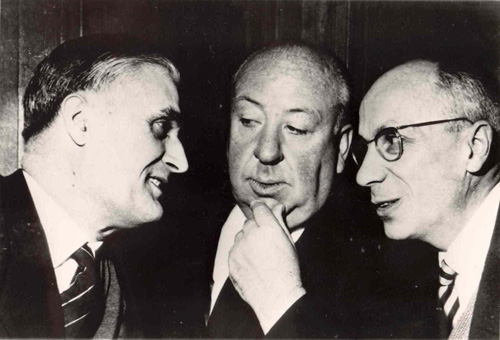 right) and Thomas Narcejac pose with Alfred Hitchcock. From the private collection of Patrice Rome” width=”350″ height=”238″>“Well? Have you seen her?”
right) and Thomas Narcejac pose with Alfred Hitchcock. From the private collection of Patrice Rome” width=”350″ height=”238″>“Well? Have you seen her?”
“Yes.”
“What did she do?”
“She went to a cemetery.”
“Passy?… To the grave of—”
“Yes.”
“You see, Roger!… You see, don’t you?”
On one corner of the desk, near the telephone, there was a photograph of Madeleine. Flavières couldn’t take his eyes off it.
“The gravestone has only one name on it. Aren’t her parents…”
“No. They’re buried somewhere in the Ardennes. On my side we’ve a family vault at Saint-Ouen… Pauline Lagerlac is the only relation she’s got at Passy. That’s what frightens me… Frankly, what do you think of this visit? Can you see any rhyme or reason in it?… And you can be sure it’s not the first time she’s been there.”
“It certainly didn’t look like it. She didn’t ask anybody the way. Though she meandered about a bit, she obviously knew where she was going.”
“Of course she did. I tell you she’s absolutely obsessed by this Pauline.”
Gévigne paced to and fro behind his desk with his hands in his pockets. On his neck, a roll of fat protruded above his collar. The telephone rang. He snatched up the receiver impatiently. Covering the mouthpiece with his hand, he said quietly:
“She thinks she’s Pauline Lagerlac. You can’t be surprised if I’m worried about her.”
A muffled voice sounded in the earphone, which he quickly lifted to his ear.
“Hallo!… Yes, Gévigne speaking… Oh, it’s you, cher ami. I was going to get in touch with you. The thing is—“
Flavières didn’t listen. He looked at Madeleine. The face of a statue, the eyes hardly bringing it to life at all. Gévigne barked back his answers, his eyebrows knitted, then banged down the receiver. Flavières was sorry he’d come. He suddenly felt that Madeleine’s mystery had to do with herself alone: Gévigne could only obscure the issue. A preposterous idea kept nagging at him: supposing Pauline’s soul—
“I lose patience with them,” snarled Gévigne. “You can’t imagine the muddle we’re in at the moment. Better you shouldn’t! It’s discouraging.”
“Is Lagerlac your wife’s maiden name?” asked Flavières.
“No. She was called Givors, Madeleine Givors. She lost her mother three years ago. Her father had died not long before. He had paper mills near Mézières. A big concern. Her grandfather founded it. He came from those parts.”
“But Pauline Lagerlac must have lived in Paris, I suppose?”
Gévigne drummed on his blotter with his podgy fingers.
“It’s all rather vague, I’m afraid… One day my mother-in-law pointed out an old house in the Rue des Saints-Pères – at least I think it was the Rue des Saints-Pères – saying that it was where her grandmother Pauline had lived. There was a shop on the ground floor – antiques, I believe… But tell me: what do you think of Madeleine now you’ve seen her?”
Flavières shrugged his shoulders.
“I can’t say much yet.”
“But you agree with me that there’s something queer about her, don’t you?”
“It seems to me… yes… Do you know if she’s really given up painting completely?”
“Completely. To the point of doing away with her studio, turning it into an ordinary sitting-room.”
“Why did she drop it?”
“Why indeed?… Of course she’s versatile—plenty of interests… And people do change…”
Flavières got up and held out his hand.
“I mustn’t take up any more of your time. I can see how busy you are.”
“You mustn’t take that line. All this simply doesn’t count. Not compared to Madeleine… Honestly, do you think she’s mad?”
“Certainly not mad,” answered Flavières. “Tell me: does she read a lot?”
“No. I wouldn’t call her a reader. Like most people, she reads the bestsellers. And magazines.”
“Any special fads or fancies?”
“I can’t think of any.”
“I’ll keep an eye on her.”
“You don’t sound very enthusiastic.”
“I’ve got such a strong feeling we’re wasting our time.”
He didn’t want to tell Gévigne he had made up his mind to follow Madeleine week in, week out, for months if necessary; that he wouldn’t recover his peace of mind till he’d got to the bottom of the mystery.
“Sorry to put it all on you,” said Gévigne, “but you see how I’m placed. What with this office and Le Havre, I don’t get a minute to myself. It took a load off my mind when you took on the job.”
He led Flavières out to the lift.
“Give me a ring if you find out anything.”
“All right. I will.”
In the street Flavières found himself in the six o’clock rush. He bought an evening paper. Two enemy planes had been brought down near the Luxembourg frontier. The leading article proved conclusively that the Germans were losing the war. They were blockaded; they were contained. The General Staff had envisaged every possibility and were only waiting for the enemy to embark on a last despairing venture.
Flavières yawned and stuffed the paper into his pocket. He couldn’t take any further interest in this war. What mattered was Madeleine. He took a seat on the terrace of a café and ordered some mineral water… Madeleine dreaming in front of Pauline’s tomb… Homesick! For the grave!… No, it was impossible. But who really knew what was possible or not?
Extracted from Vertigo, out now in a new edition from Pushkin Vertigo,in the original translation by Geoffrey Sainsbury.
Pierre Boileau (1906–89) and Thomas Narcejac (1908–98) met at the awards dinner where Narcejac was receiving the 1948 Prix du roman d’aventures, which Boileau had won ten years earlier. They got talking, and decided to try and develop a new type of crime fiction with the victim at its centre. Boileau would supply the fiendish, almost fantastical plots, and Narcejac the crucial characterisation. Their first collaboration, She Who Was No More, appeared in 1952 and, so the story goes, Alfred Hitchcock was desperate to acquire the film rights. He was beaten to it by Henri-Georges Clouzot (who filmed the novel as Les Diaboliques) but moved swiftly to get the rights to their second book The Living and the Dead when it was published in 1954. The resulting film Vertigo, starring James Stewart and Kim Novak and relocating the action from wartime Paris to San Francisco, was released in 1958.
Geoffrey Sainsbury is best known as a prolific translator of Georges Simenon’s Maigret series. He frequently altered names, psychological profiles and even plot, approved tacitly by the author since at the time the books first came out Simenon barely understood a word of English.
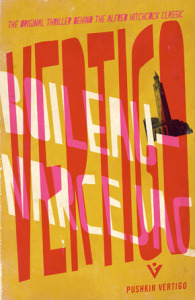 Vertigo by Boileau-Narcejac” width=”140″ height=”215″>
Vertigo by Boileau-Narcejac” width=”140″ height=”215″>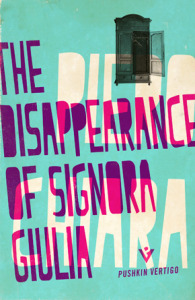 The Disappearance of Signora Giulia by Piero Chiara” width=”140″ height=”215″>
The Disappearance of Signora Giulia by Piero Chiara” width=”140″ height=”215″>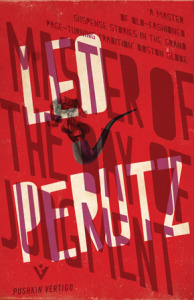 Master of the Day of Judgment by Leo Perutz” width=”140″ height=”216″>
Master of the Day of Judgment by Leo Perutz” width=”140″ height=”216″>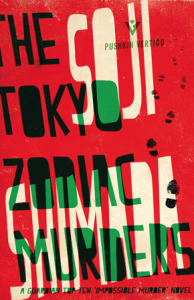 The Tokyo Zodiac Murders by Soji Shimada” width=”140″ height=”216″>Pushkin Vertigo is the new imprint from Pushkin Press, a treasure-trove of crime classics from all around the world. With distinctive jackets designed by Jamie Keenan, the books in the collection are tour-de-force thrillers by masters from the 1920s to the 1970s. The other launch titles are The Disappearance of Signora Giulia by Piero Chiara, Master of the Day of Judgment by Leo Perutz and The Tokyo Zodiac Murders by Soji Shimada. Boileau-Narcejac’s She Who Was No More and I Was Jack Mortimer by Alexander Lernet-Holenia will follow on 5 November. Read more.
The Tokyo Zodiac Murders by Soji Shimada” width=”140″ height=”216″>Pushkin Vertigo is the new imprint from Pushkin Press, a treasure-trove of crime classics from all around the world. With distinctive jackets designed by Jamie Keenan, the books in the collection are tour-de-force thrillers by masters from the 1920s to the 1970s. The other launch titles are The Disappearance of Signora Giulia by Piero Chiara, Master of the Day of Judgment by Leo Perutz and The Tokyo Zodiac Murders by Soji Shimada. Boileau-Narcejac’s She Who Was No More and I Was Jack Mortimer by Alexander Lernet-Holenia will follow on 5 November. Read more.

